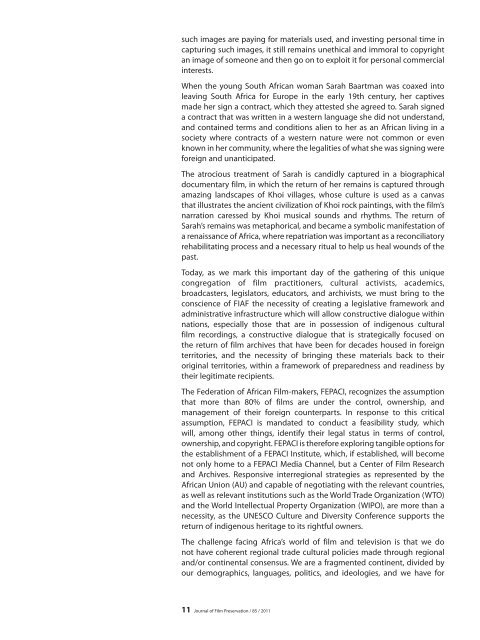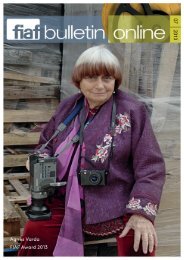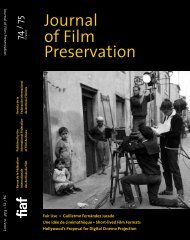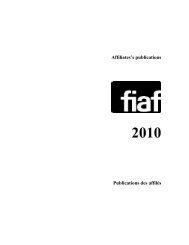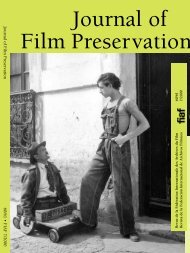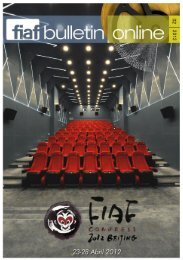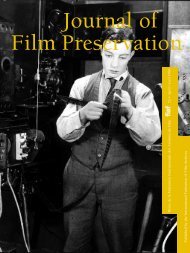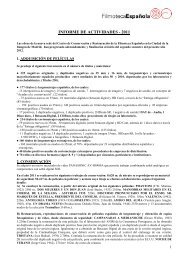Journal of Film Preservation - FIAF
Journal of Film Preservation - FIAF
Journal of Film Preservation - FIAF
Create successful ePaper yourself
Turn your PDF publications into a flip-book with our unique Google optimized e-Paper software.
such images are paying for materials used, and investing personal time in<br />
capturing such images, it still remains unethical and immoral to copyright<br />
an image <strong>of</strong> someone and then go on to exploit it for personal commercial<br />
interests.<br />
When the young South African woman Sarah Baartman was coaxed into<br />
leaving South Africa for Europe in the early 19th century, her captives<br />
made her sign a contract, which they attested she agreed to. Sarah signed<br />
a contract that was written in a western language she did not understand,<br />
and contained terms and conditions alien to her as an African living in a<br />
society where contracts <strong>of</strong> a western nature were not common or even<br />
known in her community, where the legalities <strong>of</strong> what she was signing were<br />
foreign and unanticipated.<br />
The atrocious treatment <strong>of</strong> Sarah is candidly captured in a biographical<br />
documentary film, in which the return <strong>of</strong> her remains is captured through<br />
amazing landscapes <strong>of</strong> Khoi villages, whose culture is used as a canvas<br />
that illustrates the ancient civilization <strong>of</strong> Khoi rock paintings, with the film’s<br />
narration caressed by Khoi musical sounds and rhythms. The return <strong>of</strong><br />
Sarah’s remains was metaphorical, and became a symbolic manifestation <strong>of</strong><br />
a renaissance <strong>of</strong> Africa, where repatriation was important as a reconciliatory<br />
rehabilitating process and a necessary ritual to help us heal wounds <strong>of</strong> the<br />
past.<br />
Today, as we mark this important day <strong>of</strong> the gathering <strong>of</strong> this unique<br />
congregation <strong>of</strong> film practitioners, cultural activists, academics,<br />
broadcasters, legislators, educators, and archivists, we must bring to the<br />
conscience <strong>of</strong> <strong>FIAF</strong> the necessity <strong>of</strong> creating a legislative framework and<br />
administrative infrastructure which will allow constructive dialogue within<br />
nations, especially those that are in possession <strong>of</strong> indigenous cultural<br />
film recordings, a constructive dialogue that is strategically focused on<br />
the return <strong>of</strong> film archives that have been for decades housed in foreign<br />
territories, and the necessity <strong>of</strong> bringing these materials back to their<br />
original territories, within a framework <strong>of</strong> preparedness and readiness by<br />
their legitimate recipients.<br />
The Federation <strong>of</strong> African <strong>Film</strong>-makers, FEPACI, recognizes the assumption<br />
that more than 80% <strong>of</strong> films are under the control, ownership, and<br />
management <strong>of</strong> their foreign counterparts. In response to this critical<br />
assumption, FEPACI is mandated to conduct a feasibility study, which<br />
will, among other things, identify their legal status in terms <strong>of</strong> control,<br />
ownership, and copyright. FEPACI is therefore exploring tangible options for<br />
the establishment <strong>of</strong> a FEPACI Institute, which, if established, will become<br />
not only home to a FEPACI Media Channel, but a Center <strong>of</strong> <strong>Film</strong> Research<br />
and Archives. Responsive interregional strategies as represented by the<br />
African Union (AU) and capable <strong>of</strong> negotiating with the relevant countries,<br />
as well as relevant institutions such as the World Trade Organization (WTO)<br />
and the World Intellectual Property Organization (WIPO), are more than a<br />
necessity, as the UNESCO Culture and Diversity Conference supports the<br />
return <strong>of</strong> indigenous heritage to its rightful owners.<br />
The challenge facing Africa’s world <strong>of</strong> film and television is that we do<br />
not have coherent regional trade cultural policies made through regional<br />
and/or continental consensus. We are a fragmented continent, divided by<br />
our demographics, languages, politics, and ideologies, and we have for<br />
11 <strong>Journal</strong> <strong>of</strong> <strong>Film</strong> <strong>Preservation</strong> / 85 / 2011


